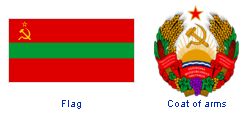Vardanian is being held in an isolation unit and without officially stated charges, according to news reports. On April 9, at a closed-door hearing at the Tiraspol City Court, Vardanian’s pre-trial detention was reportedly extended for two months. The PMR is also known as Transdniester.
Accused of committing treason
“We are outraged by the imprisonment of Ernest Vardanian and we urge Transdniester security authorities to free him at once,” CPJ Europe and Central Asia  Program Coordinator Nina Ognianova said. “We call on the Moldovan government to focus all efforts on gaining Vardanian’s swift and unconditional release.”
Program Coordinator Nina Ognianova said. “We call on the Moldovan government to focus all efforts on gaining Vardanian’s swift and unconditional release.”
On April 7, a group of armed agents from PMR’s Ministry of State Security (MGB) arrested Vardanian near his house in Tiraspol, according to local news reports. Irina Vardanian, who spoke to the press after her husband’s arrest, said the agents told her he was accused of committing espionage and high treason against the PMR for Moldova. According to Article 271 of the internal penal code of the unrecognized republic, Vardanian faces from 12 to 20 years if convicted.
Activity
Vardanian, 30, works as a staff reporter and political analyst for the Chisinau-based newspaper Puls, freelances for the Russian Internet news agency Novy Region, and occasionally contributes for Europa Libera—the Moldova and Romania service of the U.S. government-funded Radio Free Europe/Radio Liberty.
He is well-known in Moldova as an independent journalist whose articles and commentaries are often critical of officials in both Chisinau and Tiraspol.
Vasily Bontaru, Europa Libera’s chief editor told CPJ that Vardanian is known for his independent reporting and analysis on political and social issues. According to his Puls editors, Vardanian lives in the Transdniester regional capital of Tiraspol and commutes daily to the Moldovan capital of Chisinau for work.
Aleksandr Shchetinin, Novy Region’s general director, said Vardanian had recently focused on international politics rather than Moldovan and Transdniestrian issues. Shchetinin, who spoke with Irina Vardanian after her husband’s arrest, told CPJ that MGB agents searched the journalist’s home, confiscating computers, audio- and video- reporting equipment, reporter’s notebooks, and the family’s bank and credit cards.
Threats
Several local sources told CPJ that after she gave initial interviews to the press, Irina Vardanian was warned to not talk to the media. CPJ’s was unable to get through to her by phone. The sources also said journalists in Transdniester have been told by Tiraspol officials not to give any information on the case to outsiders. The PMR-appointed lawyer tasked with defending Vardanian has not been identified and has not given a public statement.
Puls’s Editor-in-Chief Dmitry Kavruk told Deutsche Welle that since the fall of 2009, the MGB in Tiraspol had been pressuring Vardanian to stop working for Chisinau media.
Tiraspol officials have been silent since Vardanian’s arrest on April 7. Repeated attempts by various media outlets, including Europa Libera and Novy Region, to contact MGB for information, have been rebuffed.
Vardanean’s arrest – a warning
Ion Manole, the chairman of the Promo-Lex human rights organization, says that Vardanian’s arrest is a warning to all nongovernmental organizations working in Tiraspol.
The chief of Moldova’s Bureau for Reintegration, Ion Stavile, told RFE/RL that the arrest is an extraordinary case. He added that Chisinau is demanding the immediate release of Vardanean.
Stavile said Moldovan officials will urge media-rights organizations and others to become involved in Vardanean’s case.
RFE/RL’s Moldovan Service reports that U.S. Ambassador to Moldova Asif J. Chaudhry says he has spoken to the leader of Moldova’s breakaway Transdniester region about arrest of Vardanian.
Grigory Volovoi, the chairman of the Transdniester Fund for Human Rights, says that Vardanian’s arrest is a clear indication of the weakness of the Transdniestrian authorities.
Vardanian was scheduled to start writing a blog for RFE/RL’s Moldovan Service.
Background The Transdniester region has a population of some 540,000, most of them ethnic Russians and Ukrainians. It declared independence from Moldova in 1990 and fought a brief war with Moldovan forces two years later. The self-proclaimed PMR is not recognized by the international community.
The Transdniester region has a population of some 540,000, most of them ethnic Russians and Ukrainians. It declared independence from Moldova in 1990 and fought a brief war with Moldovan forces two years later. The self-proclaimed PMR is not recognized by the international community.





